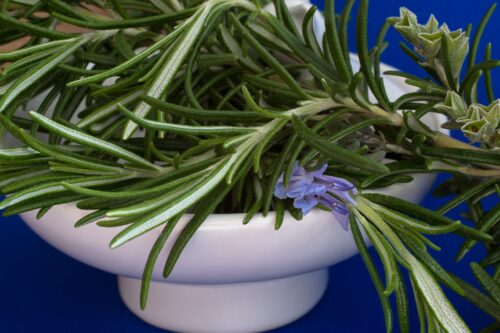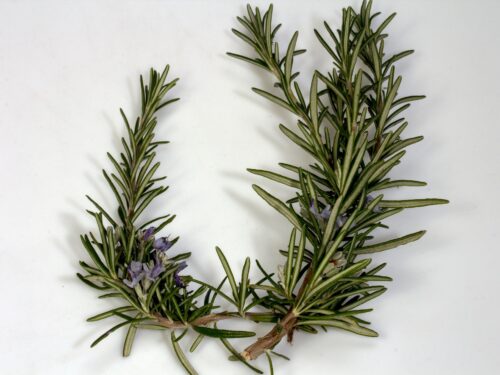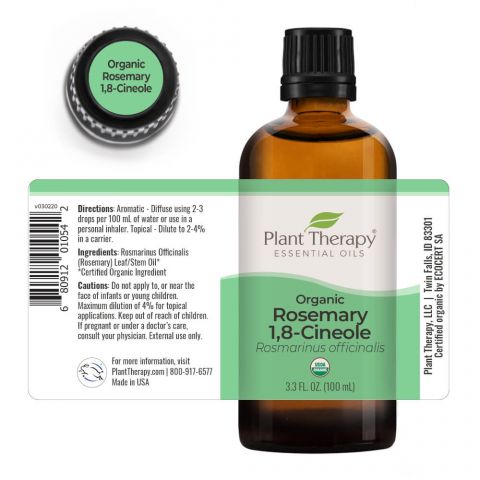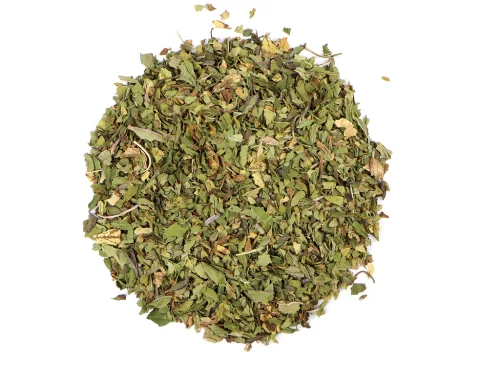
Rosemary (Rosmarinus officinalis)
The rosemary plant, Rosmarinus officinalis L (family Lamiaceae), is an aromatic evergreen shrub originating in the Mediterranean region and now growing widely in Europe, Asia, and Africa. This plant has been used extensively as a culinary spice in a variety of contexts. Rosemary and its extracts also are used as food preservatives and enhancers of sensory and functional properties. Today, research attention is focusing more closely on whether this herb may have potential to alleviate complications of obesity and diabetes, inflammation-associated conditions, and neurological deficits.
Recent research has shown that whether consumed as an essential oil, tea or seasoning, rosemary benefits can include promoting digestive health, mental clarity, hair and skin health, relaxation and more.
Rosemary Nutrition
According to USDA, fresh rosemary has a high reserve of vitamins such as vitamin A, vitamin C, vitamin B6, thiamin, and folate. It contains minerals like magnesium, calcium, and iron. Moreover, it has abundant antioxidants in the form of phenolic compounds like diterpene, carnosol, and rosmarinic acid. The essential oils in it contain powerful ingredients such as cineol, camphene, borneol, bornyl acetate, α-terpineol, and α-pinene.

Benefits of Consuming Rosemary Leaf
Antimicrobial. Within rosemary there are compounds that can help defend against proliferation of certain types of harmful bacteria, including those that contribute to infections. Rosemary extracts are even used as food preservatives in some cases because they can help stop bacteria from growing. The smell of rosemary also acts as a natural bug repellent and may help prevent certain insect bites, including from ticks and other bugs that can spread illnesses and viruses.
Antioxidants. Because of its rich supply of antioxidants and bioactive chemicals (including phenolic diterpenes, such as carnosol and caffeoyl derivatives), consuming rosemary can help fight oxidative stress and support the immune system. It is also known to promote healthy circulation and to defend against inflammation, which can lead to pain. Another way that rosemary’s antioxidants can be beneficial is due to the ability to promote skin health by fighting free radical damage that leads to signs of aging.
Cancer. Rosemary contains carnosic acid, a compound known for its powerful antioxidant properties. Studies have found that carnosic acid can slow the growth of cancer cells in the body and even lower the risk of developing tumors.
Gut Health. Rosemary has traditionally been used as a natural remedy for upset stomach, constipation, gas, bloating as it helps in relaxing the muscles of the intestine. Adding it to your diet can help you regulate your bowel movements and your gastrointestinal system. One study showed that in test subjects with colitis, treatment with rosemary extract was effective to reduce colon tissue lesions and colitis. This, in turn, helps maintain gut health and fight gut diseases like irritable bowel syndrome (IBS) and colitis.
Immune Support. Studies have shown that the carnosic and rosmarinic acids in rosemary have powerful antibacterial, antiviral, and antifungal properties. Consuming rosemary regularly can potentially help lower the risk of infection and help the immune system fight any infections that do occur.

Indigestion. This herb, whether cooked with or steeped in herbal tea, has long been a natural remedy for digestive issues, including loss of appetite, heart burn/acid reflux, gas, bloating and abdominal pains. It seems capable of stimulating the release of digestive fluids including bile, which assists in digestion and can support normal nutrient absorption.
Low blood pressure. Early research shows that taking rosemary oil three times per day increases the top number in a blood pressure reading (systolic blood pressure) and the bottom number (diastolic blood pressure) in people with low blood pressure. Blood pressure seems to return to pretreatment values once rosemary use is stopped.
Memory. Taking rosemary by mouth may mildly improve memory in young adults. Using rosemary aromatherapy seems to improve some measures of memory. Rosemary aromatherapy also seems to increase alertness.
Decline in memory and thinking skills that occurs normally with age. Early research shows that taking powdered rosemary leaves might improve memory speed in healthy, older adults. But higher doses seem worsen memory. Other early research shows that taking a product containing rosemary, lemon balm, and sage improves memory in healthy adults 62 years or younger. But it does not seem to improve memory in adults 63 years or older.
Metabolic Health. Rosemary has been associated with metabolic benefits including helping to treat high blood sugar and poor insulin sensitivity. While it likely will not be enough to prevent diabetes on its own, it is recommended for people who wish to improve their high blood sugar levels.
Withdrawal from heroin, morphine, and other opioid drugs. Early research suggests that taking rosemary leaves along with methadone, improves opioid withdrawal symptoms.

Benefits of Using Rosemary Oil
Hair Growth. Rosemary oil helps to promote hair growth, prevent baldness, slow graying, and treat dandruff. A comparative study published in 2015 shows that rosemary oil is effective in treating alopecia by boosting hair growth. At six months, a significant increase in hair count was noted for the group treated with rosemary oil. It also promotes healing by increasing microcirculation of the scalp and decreases hair loss after shampooing.
Male-pattern baldness (androgenic alopecia). Early research suggests that applying rosemary oil to the scalp is as effective as minoxidil for increasing hair count in people with male-pattern baldness.
Mental Activity. Rosemary essential oil is an excellent brain and nerve tonic. It is often used by students during exam times because it increases concentration and helps in studying efficiently. It stimulates mental activity and is a good remedy for depression, mental fatigue and forgetfulness. Inhaling rosemary oil seems lift your spirits immediately. Whenever your brain is tired, try inhaling a little rosemary oil to remove boredom and renew your mental energy.
Pain Relief. The ability of rosemary essential oil to relieve pain has resulted in its extensive use in treating headaches, muscle pains, rheumatism and even arthritis. Massaging the affected area that is in pain with rosemary essential oil can give quickly relieve the pain. Vapor baths with rosemary oil are also found to be effective in the treatment of rheumatism. It has certain anti-inflammatory qualities as well, which makes it perfect for relieving the pain from sprains and joint aches. Furthermore, it is known to stimulate blood circulation, which can relieve pain and aid in coagulation of wounds for faster healing.
Respiratory Problems. The benefits of rosemary essential oil in treating respiratory problems are well-researched and supported. The scent of the oil has been shown to give relief from throat congestion, and it is also used in the treatment of respiratory allergies, colds, sore throats and the flu. Since rosemary oil also has antiseptic qualities, it is also effective for respiratory infections. The oil is antispasmodic and is therefore used in some treatment programs for bronchial asthma.
Sexually Transmitted Diseases. Recent research suggests that the use of rosemary essential oil’s antimicrobial qualities can help reduce the effects and recurring inflammation of the herpes virus. The herpes virus can quickly develop immunity to normal antiviral medication, so alternative methods are always being explored. Several studies have now shown the essential oil of rosemary to be an effective option for reducing the symptoms of the Herpes virus in test subjects, and even affects the level of contagiousness of the virus.
Skin care. Rosemary essential oil is not used in skin care as extensively as it is used in hair care, but it does have antimicrobial and antiseptic qualities that make it beneficial in efforts to eliminate eczema, dermatitis, oily skin, and acne. Topical application of the essential oil, or regular massage with the oil helps in toning your skin and removing dryness. It can also give your skin a healthy, even glow when applied regularly, or when it is a main component of your moisturizers and other creams.
Stress. Some early research suggests that rosemary and lavender oil aromatherapy may reduce pulse rates, but not blood pressure, in people taking tests. Rosemary may have a calming effect on those who suffer from anxiety and depression. An animal study conducted on the antidepressant effects of rosemary concluded that the herb is effective in improving the symptoms of depression. These beneficial effects were observed even with repeated administration two weeks later. Furthermore, it may also reduce cortisol (the stress hormone) levels, which helps ease tension in the body.

Dosing of Rosemary
The following doses have been studied in scientific research:
BY MOUTH: For memory: 500 milligrams of rosemary extract twice daily for one month has been used.
INHALED AS AROMATHERAPY: For memory: Four drops of pure rosemary essential oil (Tisserand Aromatherapy) has been applied to an aromatherapy diffuser pad 5 minutes before testing.
Ways to Eat Rosemary
- It is made into herbal tea to promote digestive health and relaxation.
- It helps season meats in the cuisines of Europe and the Middle East.
- It is often found in marinades for lamb, pork, turkey and chicken dishes.
- Rosemary leaves are added to soups and beverages in India for their flavor and nutrient content.
- Whether dried or fresh, it is added to stews, casseroles, fish, potatoes, salads, pastas, and breads in many European countries.
- The Spruce Eats recommends also pairing it with grains, mushrooms, onions, peas and spinach.
Rosemary Tea
- To make rosemary herbal tea, combine 1 teaspoon of chopped herbs (preferably fresh) with 8 ounces of water.
- Steep the herbs for 5 minutes or longer, depending on the strength you’re looking for.
- You can also add other herbs and flavor enhancers, including lavender, thyme, parsley, lemon juice or raw honey.
- Consuming about 1–2 cups daily is safe for most, although use caution if you take any medications

Side Effects of Consuming Rosemary
Consuming large amounts of Rosemary leaf or essential oil can cause vomiting, uterine bleeding, kidney irritation, increased sun sensitivity, skin redness, and allergic reactions.
Rosemary might stimulate menstruation or affect the uterus, causing a miscarriage. There is not enough reliable information to know if rosemary is safe when applied to the skin when pregnant. Stay on the safe side and avoid use.
Aspirin allergy. Rosemary contains a chemical that is like aspirin. This chemical may cause a reaction in people who are allergic to aspirin.
Bleeding disorders. Rosemary might increase the risk of bleeding and bruising in people with bleeding disorders. Use cautiously.
Seizure disorders. Rosemary might make seizure disorders worse. Do not use it.
Medication Interactions
Rosemary has the potential to alter urination, blood clotting and blood pressure levels, which means it can potentially interact with certain medications and should be avoided in these cases. Speak with your doctor before adding large amounts or rosemary or this essential oil to your diet if you take these drugs:
- Anticoagulants/blood thinners
- ACE inhibitors for high blood pressure
- Diuretics
- Lithium for mental health disorders








